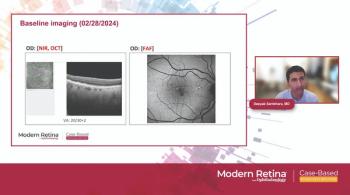
RetinAI and Boehringer Ingelheim partner to further AI identification and treatment of geographic atrophy
RetinAI announced their new partnership with Boehringer Ingelheim with the goal to improve patient outcomes in geographic atrophy (GA) by combining their respective expertise in artificial intelligence and retinal disease research.
RetinAI Medical AG (RetinAI) announced their new partnership with Boehringer Ingelheim. Together, the companies aim to improve patient outcomes in geographic atrophy (GA) by combining RetinAI’s Discovery® platform and tools with Boehringer Ingelheim’s retinal disease research.
RetinAI’s AI tools for identifying novel biomarkers will be tested for the analysis of Boehringer Ingelheim’s imaging datasets from clinical studies and real-world evidence to identify additional, novel biomarkers, and predictors of disease progression. This integration of advanced digital technologies and AI may help accelerate the development of novel treatments and enable earlier, more precise diagnosis.
“RetinAI is excited to embark on this very important collaboration with Boehringer Ingelheim, a leader in the development of innovative, more precise treatments and application of digital technologies in retinal diseases,” says Dr. Carlos Ciller, CEO of RetinAI in the press release. “Our Discovery platform and novel AI tools in GA accelerate research and provide robust disease insights. We are confident that this collaboration with Boehringer Ingelheim can pave the way to novel treatments that are better tailored to a patient’s disease to transform the lives of people living with retinal diseases.”
Founded in early 2017, RetinAI is a Swiss company building tools to collect, organize and analyze health data from the eyes, enabling healthcare professionals to make the right decisions sooner in healthcare. RetinAI partners with experts in ophthalmology to help accelerate data analysis and achieve target-based research for improved study design, clinical studies, and research. RetinAI’s data management platform and models, including AI models for Geographic Atrophy progression prediction, analyze datasets at-scale to gain a deep understanding on biomarker profiles and patient subgroups or outcomes.
Newsletter
Keep your retina practice on the forefront—subscribe for expert analysis and emerging trends in retinal disease management.








































